Lebanon is in the News Again
But not for the reasons it deserves. A story about 2019's "WhatsApp Revolt," and a country widely misunderstood by the West.
Lebanon is in the news again, and sadly not for the reasons it deserves. I had the chance to finally visit Beirut — once affectionately, and perhaps pejoratively, dubbed the “Paris of the Middle East” — in December 2019, and truly loved it. I ate incredible food, met genuinely lovely people, and visited historic temples, mosques and churches. (To the surprise of many, the country is about ⅓ Christian.)
I even saw a drag show and enjoyed a late night out at a hip club, with music provided by a very good DJ.
But to my surprise, I arrived to find the country in turmoil. Long-time corruption and a financial liquidity crisis had begun rocking Lebanon since at least August of that year, and dramatic, sometimes violent, protests had transformed the center of the capital into something resembling a war zone.
I loved my time in Lebanon despite all this, but I’d like to return in the future. One night I ate in a restaurant that had been recommended to me, and it was nearly empty except for two women at a nearby table. As they paid for their meal, one asked if I was visiting, and where from.
When I said I loved the city, she said something like “Yes, but you must come back. This isn’t Beirut — the city’s never been so dead. Even during the civil war, people still had money, they went out to enjoy themselves. But now, with the recession, it’s quiet. You wouldn’t have eaten here without a reservation far ahead of time.”
I was appalled that I hadn’t realized the country was enduring so much before visiting. I’d been on a work trip to Europe, and decided to tack on a short visit to Lebanon. It had been high on my bucket list since living in Turkey a decade before, ever since I’d heard rumors that Beirut was a lively, incredible city.
You may think it was stupid of me to visit without first researching the protests there, and you’d be right. But in my defense, when I began posting photographs of street art and protests to Instagram, friends back home were also shocked — it became clear that American media had all but completely ignored the ongoing tumult. When I was in Beirut and trying to learn more about the conflict, it was in fact hard for me to even find English-language news covering it. Even as I was in the country watching the protests unfold before my own eyes.
It’s tragic to me that most American media only focuses attention on places like Lebanon when (like this week) bombs start falling — thus reinforcing the notion that the only interesting thing to happen there is, well, bombs.
The “WhatsApp Revolt”

I was surprised in Beirut to hear that the protests had been, at least superficially, sparked by a proposed tax on voice calls made with WhatsApp and other apps. The tax was announced in October 2019, and amounted to $6 per month — a number that must have felt especially steep to Lebanese citizens, given all we’ll soon learn happened in the economy leading up to that point. Mass protests broke out, the law was repealed before it could go into effect, and the country’s Prime Minister, Saad Hariri, submitted his resignation soon after.
The country’s protests weren’t only about the WhatsApp tax, of course: it was seemingly only the straw that broke the proverbial camel’s back. (A camel which, I’ve just learned, is highly unlikely to live in Lebanon.) As one protestor told BBC, “‘We are not here over the WhatsApp, we are here over everything: over fuel, food, bread, over everything.’”
And as Gallup reported a protestor saying rather brilliantly on local television, “‘WhatsApp is the only social media we have to vent our frustrations; now they want to tax our venting as well.’”
What led to the protests in Lebanon to make a thing so seemingly small and silly as a “WhatsApp tax” erupt in mass protest? A whole hell of a lot.
For years, the Lebanese public had viewed their government as terrifically corrupt and incompetent. According to Gallup, “Lebanon led the world [in 2018] in perceived government corruption, with nearly all Lebanese adults (93%) saying corruption is widespread throughout their government. But this has been the status quo for years in Lebanon; that percentage hasn't dropped below 90% since 2012.”
And this wasn’t for nothing. According to Chatham House, a British think tank:
“Politics in Lebanon is based on a sectarian power-sharing structure created on independence from France in 1943. The constitution guarantees all 18 religious sects in the country are ensured representation in government, the military, and the civil service.
Reflecting this, the three key government positions of president, prime minister, and speaker must be split between a Maronite Christian, a Sunni Muslim, and a Shia Muslim.
At first glance this could be viewed as an attempt to ensure equality in government, but the system is deeply flawed. It was agreed primarily as a division of power between the elites of the time rather than a structure aimed at ensuring good governance of a nation state.
The effect is a weak, corrupt, patronage-based system, where powerful men dispense government jobs to receive loyalty from employees rather than to reward competence or skill.”
Then in October of 2019, the country experienced a series of “calamitous economic shocks: private banks stopped allowing customers access to their dollar-denominated savings and current accounts; the Lebanese currency lost its engineered stability for the first time in 30 years; the unemployment, inflation and poverty rates, as well as all other socio-economic indicators, were showing Lebanon heading towards economic and social turmoil.”
Indeed, according to the World Bank, Lebanon’s 2019 economic crisis may have been the third worst since 1850. According to the BBC at the time, the country held “the third-highest public debt-to-gross domestic product (GDP) ratio in the world at 150%. The youth unemployment rate has reached 37%... while the overall unemployment rate is 25%. Almost a third of the population now lives under the poverty line.”

As if all this weren’t enough, on October 14 of that year (from the BBC again), “unprecedented wildfires swept through the country's western mountains, and Cyprus, Greece and Jordan were called upon for help after it was revealed Lebanon's own fire-fighting aircraft was not in a fit state to deal with the blaze due to a lack of funds. Residents were left unimpressed, with some noting how riot police vehicles equipped with water cannons had been fully maintained and were able to help battle the flames.”
And so it’s no surprise that when the government proposed new taxes on tobacco, gas, and WhatsApp voice calls — a mere three days after they dropped the ball on the wildfires — people were pissed.
It seemed for a while that a shared loathing of the national government even helped bridge sectarian divides in the country. “The people taking part are demanding accountability not just from the government as a whole, but the leaders of their own sects,” reported the BBC. “"All of them means all of them,’ is one of the main slogans adopted by protesters. Sunni protesters in Tripoli were even reported to be chanting in support of Shia demonstrators in Tyre, who had faced threats and intimidation from Hezbollah and another Shia group, Amal.”
Note there that Hezbollah threatened ordinary protestors, that the organization by no means represents all Lebanese people. As the BBC continued to report, “black-clad men loyal to Hezbollah and another Shia group, Amal, ransacked a protest camp in central Beirut, chanting slogans, setting tents on fire and beating anti-government demonstrators. A roadblock set up by protesters was also attacked.”
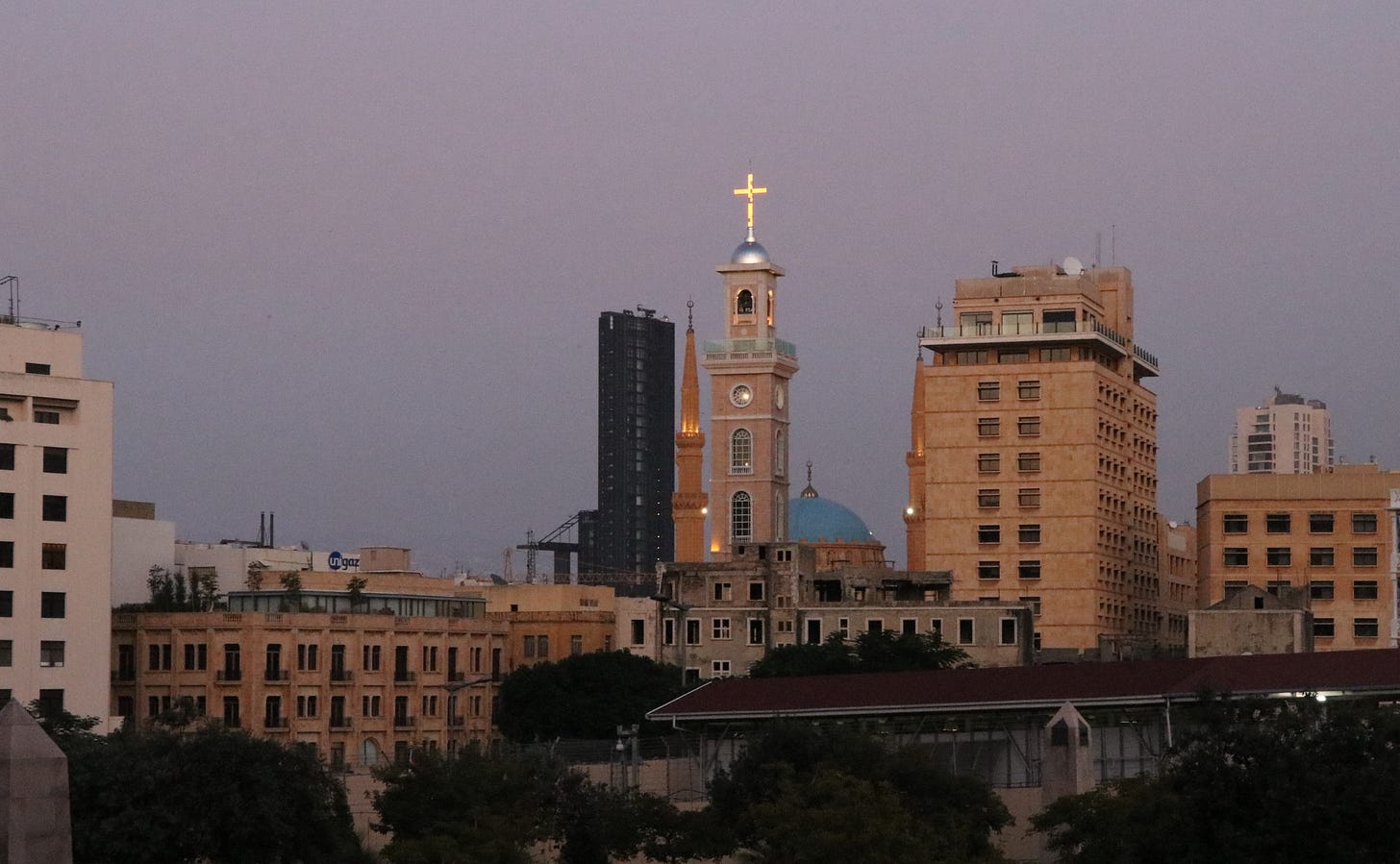
…The “WhatsApp Revolt”?
Despite headlines like Gallup’s calling Lebanon’s protests a “WhatsApp Revolt” — wording reminiscent of the effluvious praise heaped on Facebook and Twitter for the “revolutions” enabled by them years before — technology in Lebanon didn’t really cause all the fervor.
The triggering of protests due to a WhatsApp tax should at least serve as a reminder, as I’ve written before, that America is weird. If a WhatsApp tax were passed in the US, I imagine many would respond with a sort of shrug, a questioning, “It seems strange to tax something almost no one I know uses…?”
But something like three billion people worldwide use WhatsApp; that’s more than half the approximately 5.35 billion global internet users. And the vast majority of the rest use one of a dozen other apps like WeChat, Telegram, LINE, and KakaoTalk.

And for all the myriad purposes our phones can now fulfill (even when it feels deeply unfulfilling to use them), they still primarily exist for communication. Perhaps the most fundamentally human thing we do is communicate, and it should come as no surprise that Lebanese citizens reacted so strongly to their incompetent, corrupt government daring to increase the price of this deeply human activity.
And finally, all this should remind us — despite threats of war, and news glossing over the fact — that when a government is a mess, wherever in the world that mess may be, it’s ordinary citizens who suffer most.
Song of the Week: Mashrou’ Leila — NPR Music Tiny Desk
Mashrou’ Leila comes from Beirut, and recently disbanded. But the band’s lead singer, Hamed Sinno, is openly gay and non-binary, and the group is widely seen as expanding the acceptance of LGBTQ+ individuals in the Middle East. I was lucky enough to see them play live in San Francisco, and can’t recommend them enough. And because they’re no longer together — and because their music videos are beautiful and brilliant — I’m including a few more links below this one.
Cavalry — a song and video dedicated to Palestinian resistance to occupation:
Roman — a beautiful video with stereotype-breaking headscarved women:
Raksit Leila — an early Latin-esque song that the band says means “nothing.” Though the big eggplant emoji is provocative:

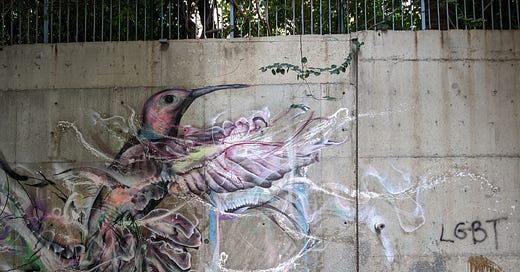


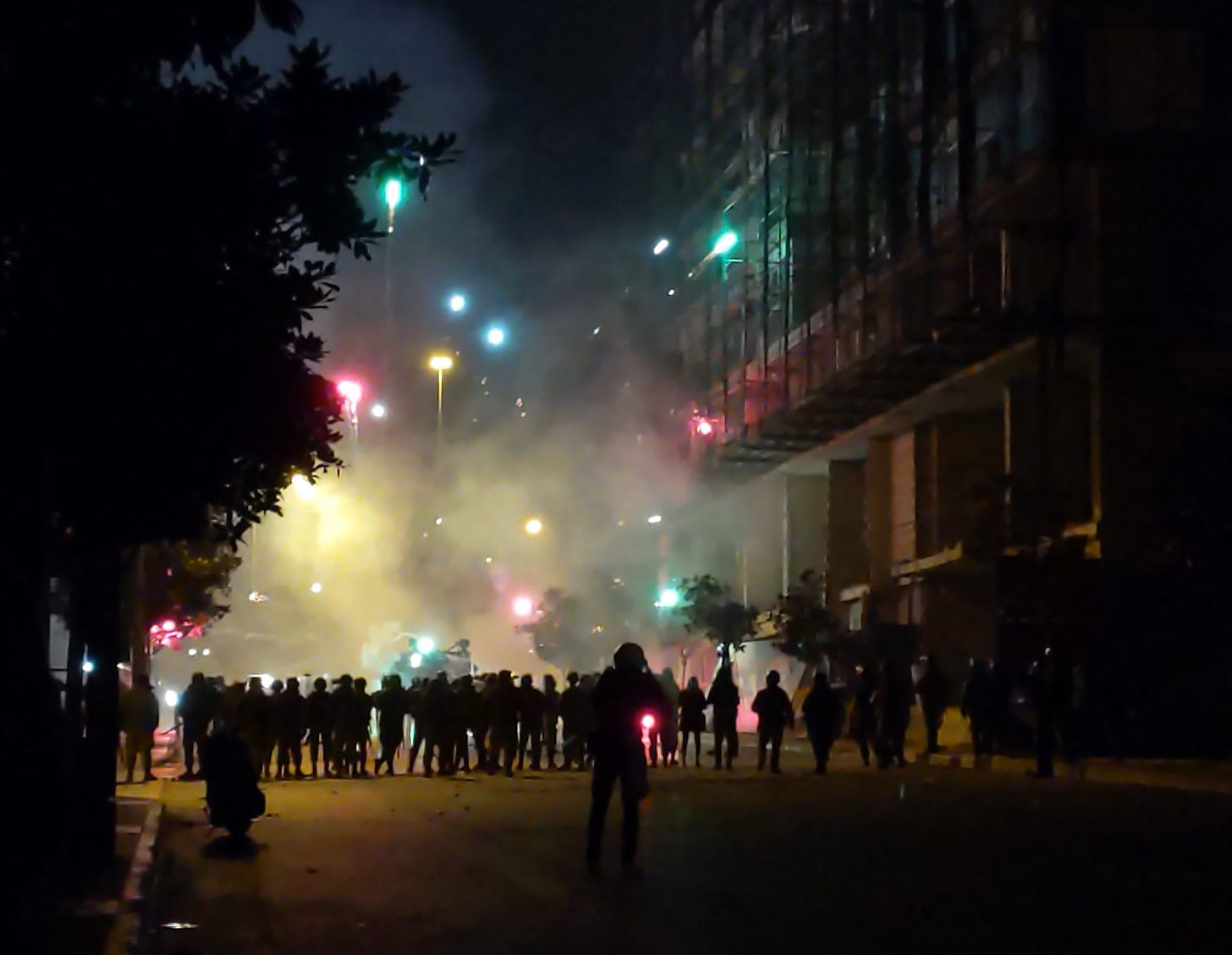
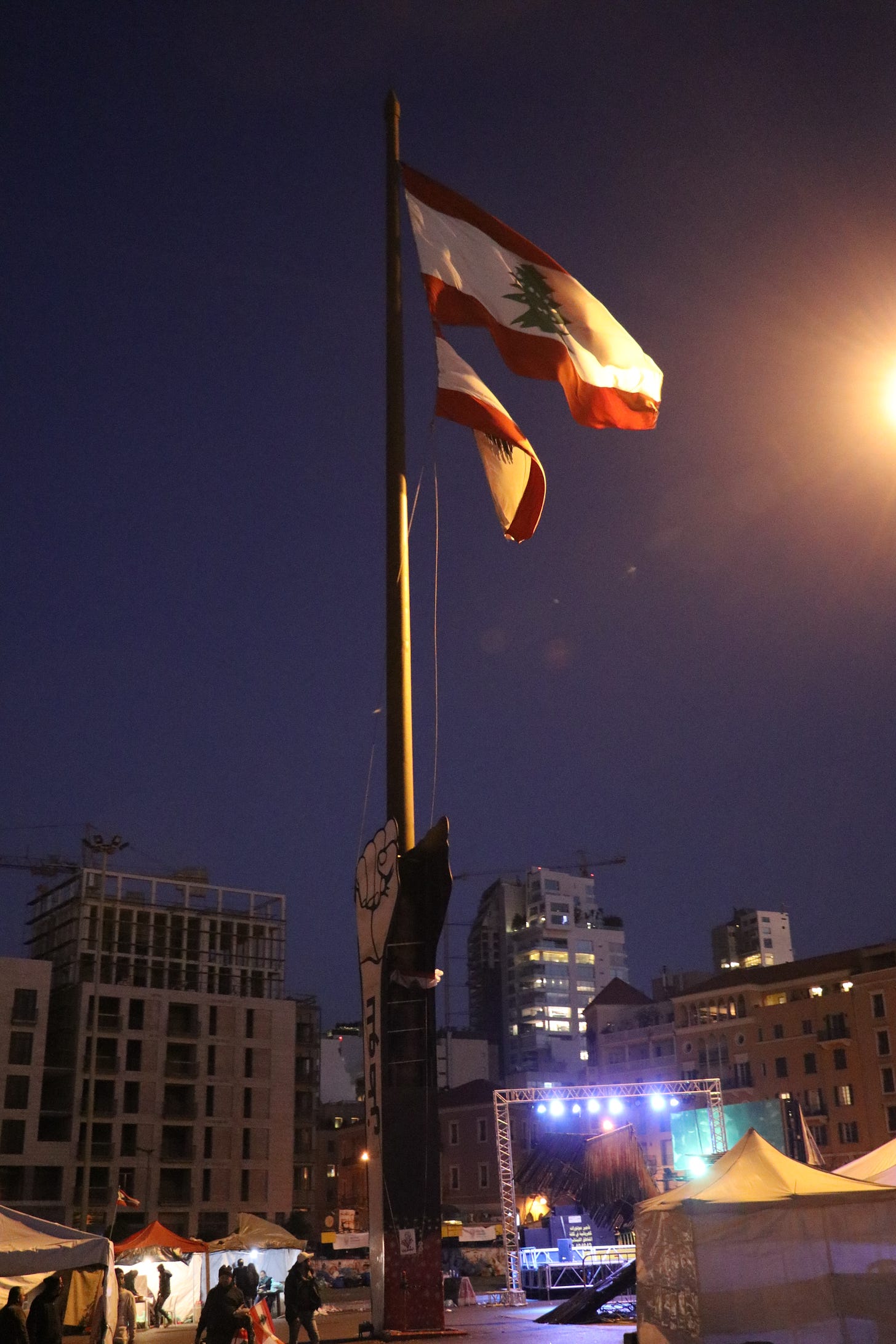
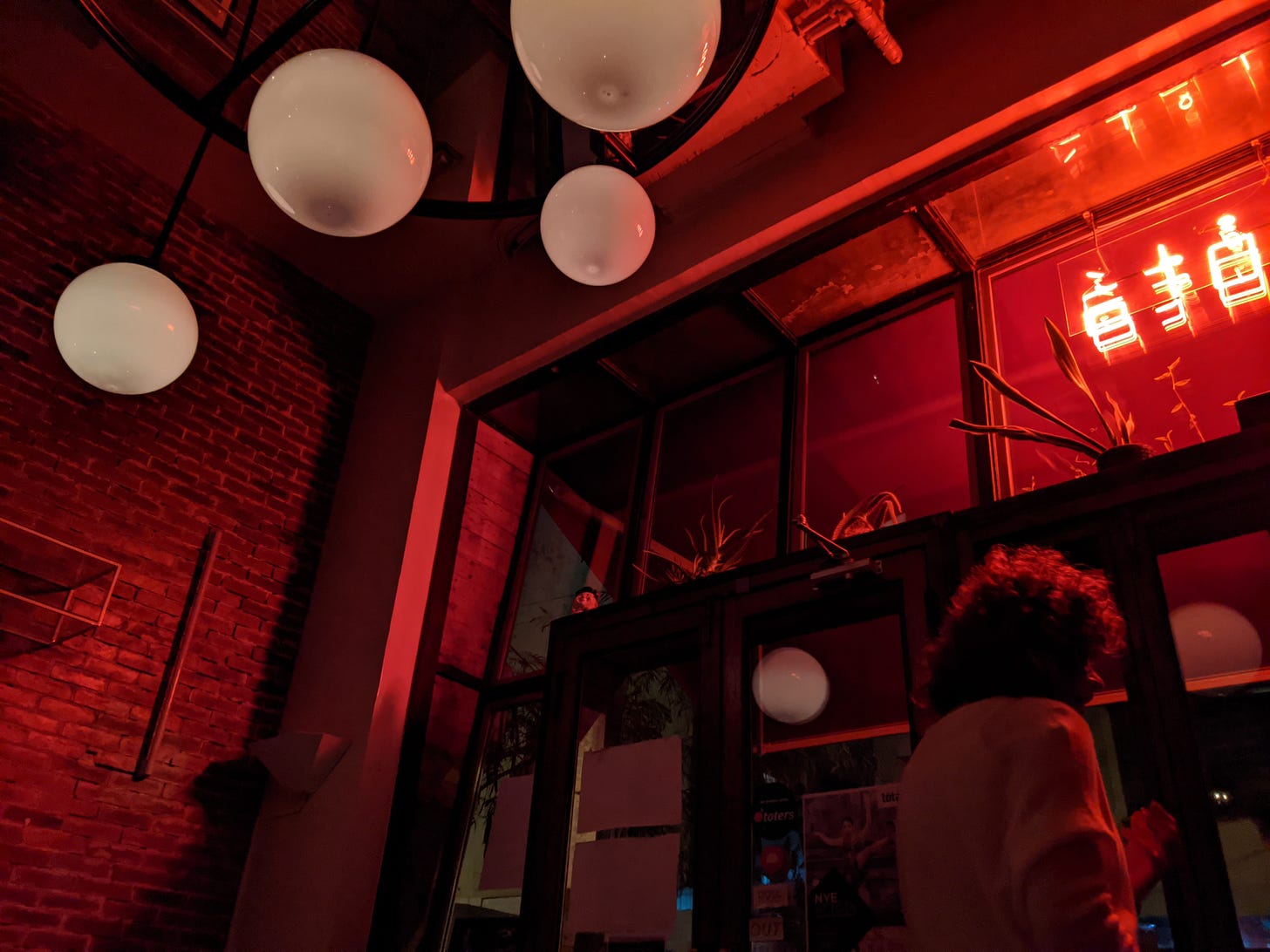
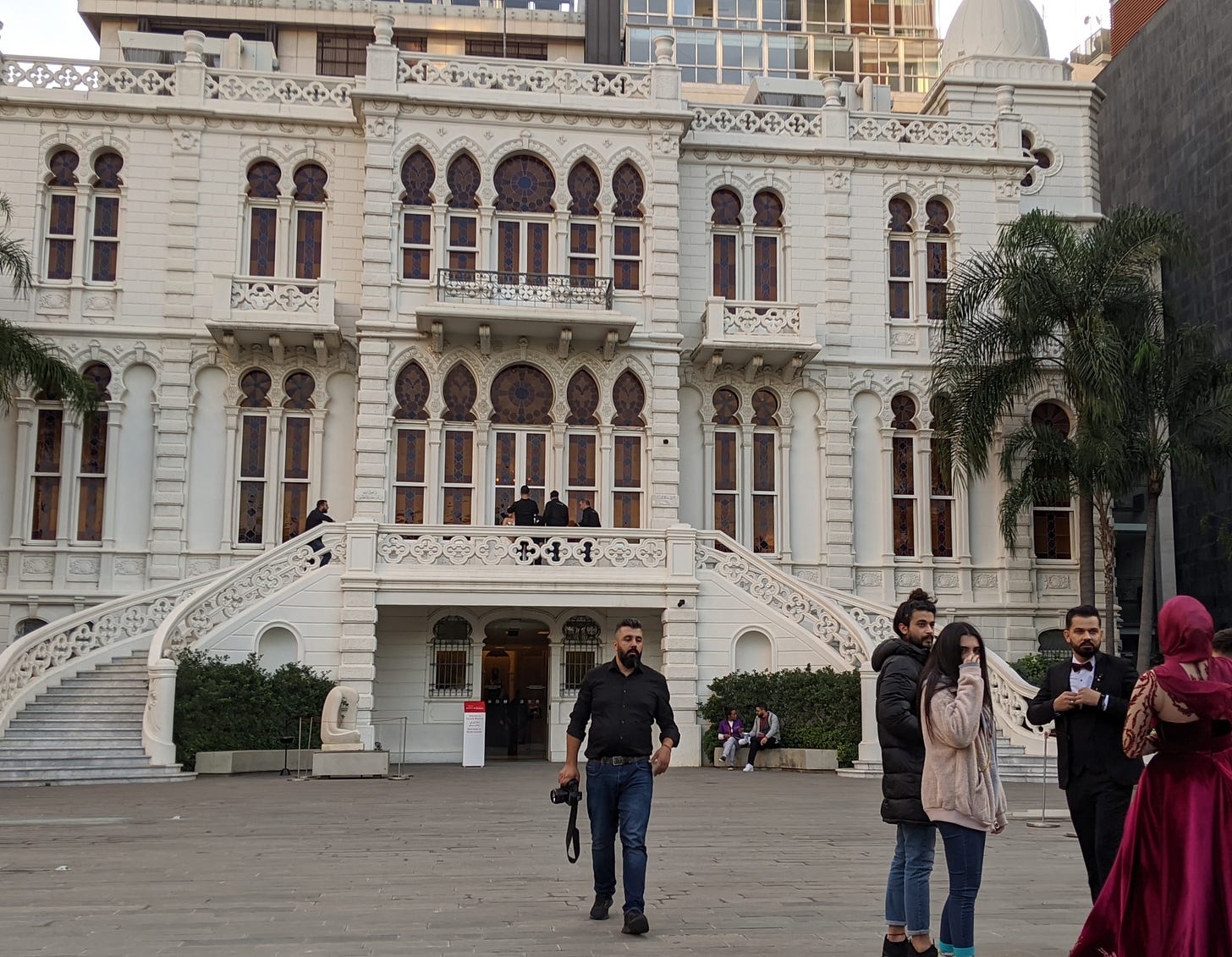
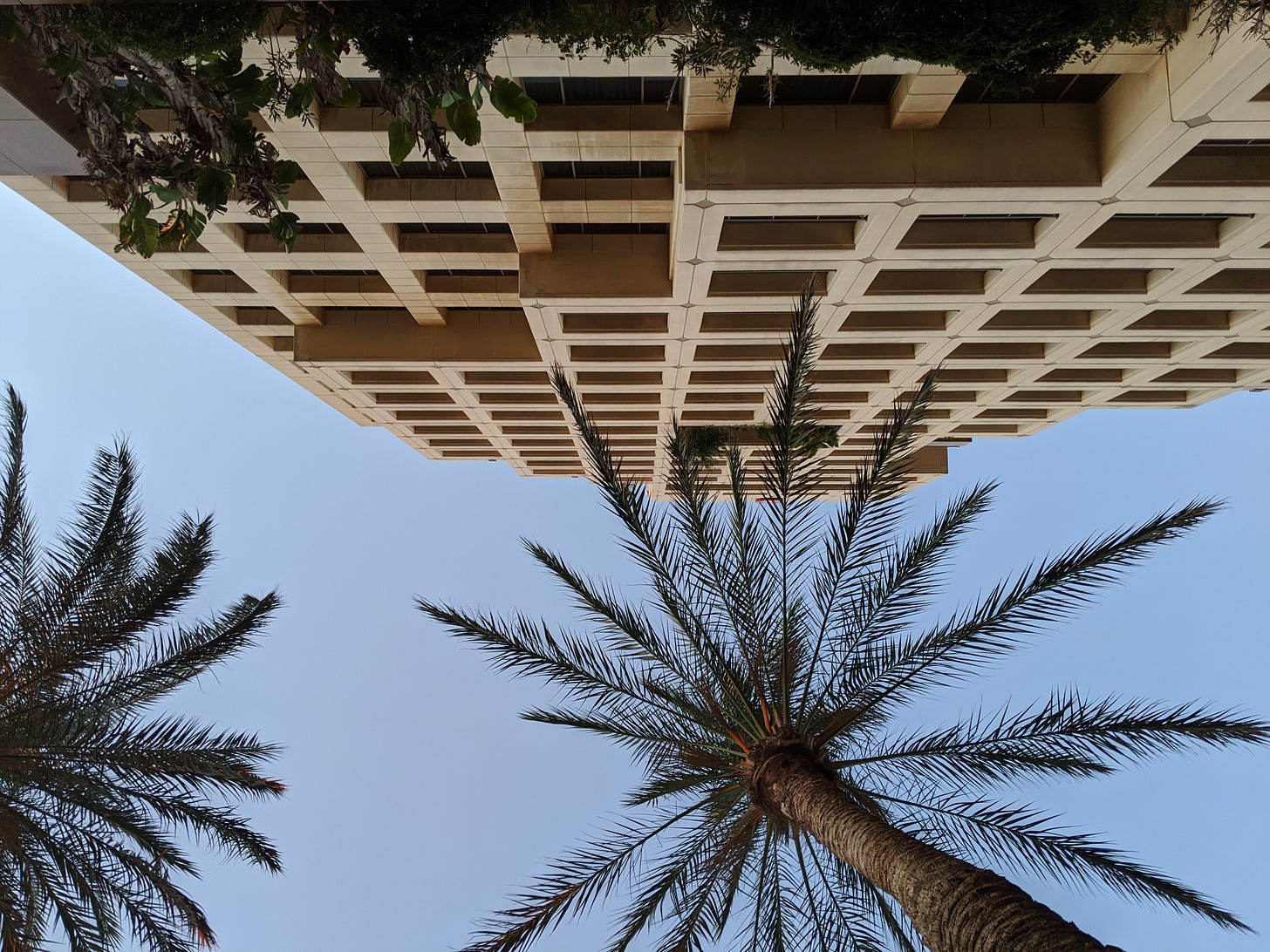

Thanks for sharing this recent history in which the WhatsApp tax sparked greater protests, and the vibrant resistance in music and street art. Your anecdote of a woman saying that even during the civil war, people were going out and enjoying, jives with what a person whose family immigrated from Lebanon to Michigan recently told me; sounds like a special joie de vivre. Not to romanticize, the sense of togetherness among friends & relatives that some people in other countries preserve and even strengthen in conditions of conflict and poverty, and their social support that carries over in immigration to the U.S., seems in contrast to the U.S. where the nuclear family is preached as the ideal and experiences of violence and poverty tend to be silenced and stigmatized, further perpetuating and alienating. Perhaps Americans can take a cue from Lebanese people in more openly acknowledging the problem of rife corruption.
Good reminder of the way we (Americans) forget to pay attention to the rest of the world. What do you use to stay appraised of non-US news?